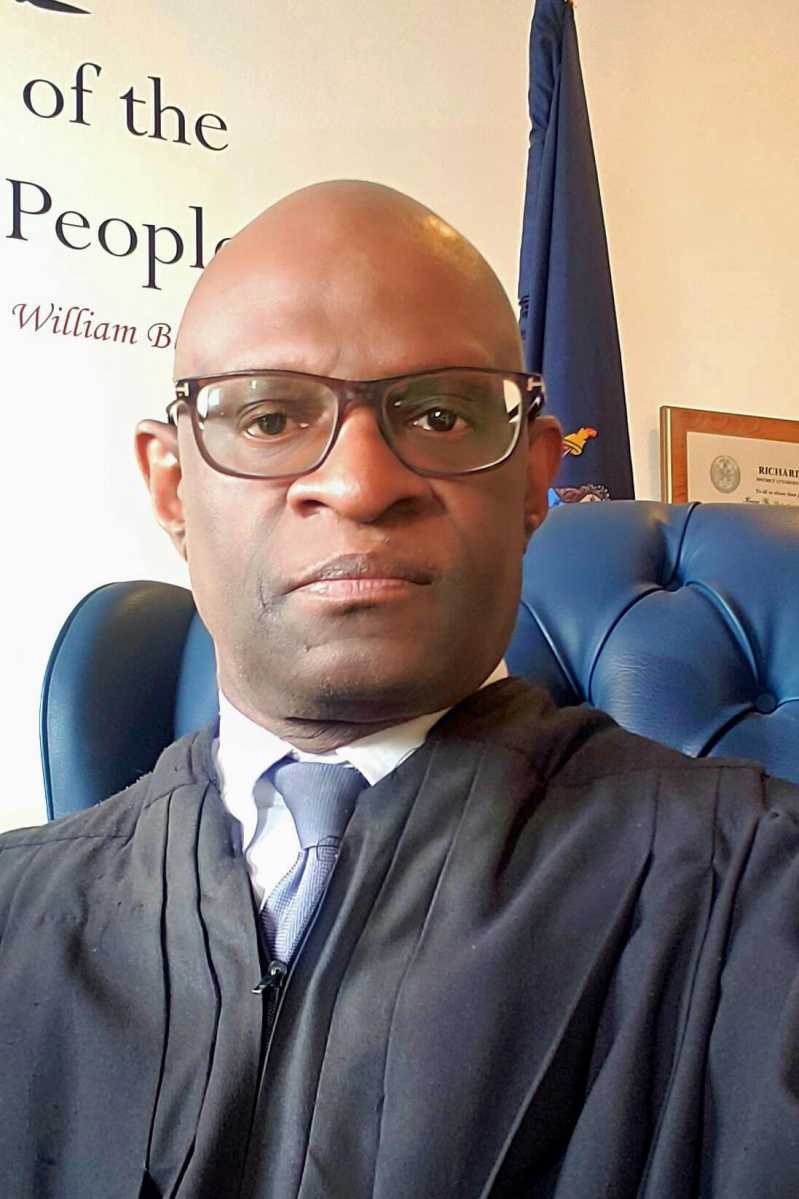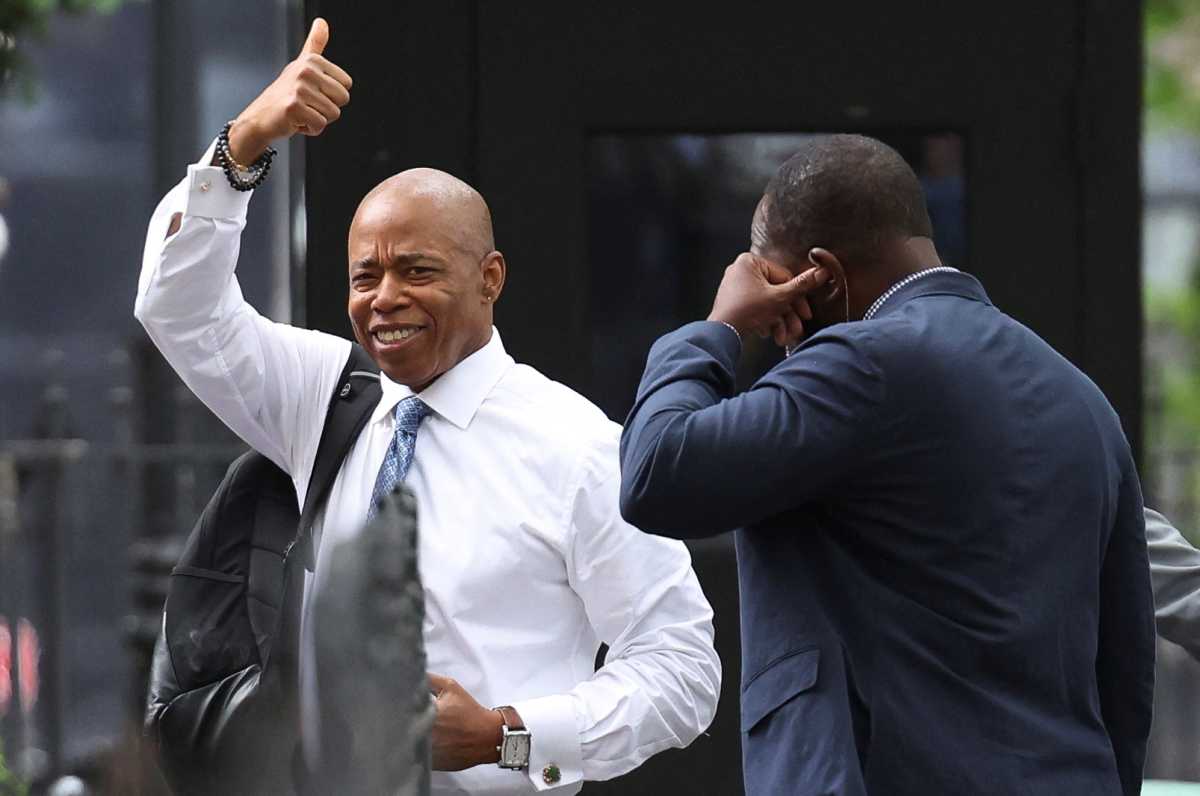Justice Kenneth Holder, who was born in England to a Jamaican mother and a Guyanese father, says that serving on the bench in the Queens Supreme Court continues to be “an honor” for him.
Justice Holder, the only male judge of color in Queens County, told Caribbean Life, in an exclusive interview over the weekend, that his journey — comprising travels, personal experiences, educational and professional training – has provided him with the tools necessary to sit on the bench and provide the litigants before him with a fair trial, as they embark on their quest for justice.
“My involvement with the Queens Drug Treatment Court is one of my most satisfying professional accomplishments,” he said. “We managed to divert thousands of young men and women from the revolving door of the criminal justice system.
“We assisted them in beating their addiction and provided them with the tools they would need to take advantage of life’s opportunities,” he added.
One might say that Justice Holder is “mix-up, mix-up.” After leaving England in 1966, Holder and his family moved to Windsor, Canada, where they resided for about a year.
They then moved to Trelawney, Jamaica, where he attended school for about two years.
Thereafter, in 1969, the Holders found their way to Queens Village, New York, where he continues to reside.
A product of the public school system and notably Lincoln University in Pennsylvania — the oldest, historically-Black, private university in the country — Justice Holder has come quite a long way.
After attending law school in Ohio, at the University of Toledo, Justice Holder found himself back in his hometown of Queens and immediately started working for the office of the Queens District Attorney.
In 1985, he was appointed Assistant District Attorney in the Queen’s District Attorney Office. In 1991, he was promoted to Deputy Bureau Chief of the Narcotics Investigations and Trials Bureau.
A year later, Holder was appointed Chief of the Narcotics Trials Bureau and was responsible for the prosecution of all street level narcotic offenses occurring in Queens County. He served a total of 20 years in that office.
“During this time, the drug war in Queens was at full strength, especially on the heels of the assassination of Police Officer Eddie Byrne,” Justice Holder said. “That event saw the officers assigned to the Queen’s Narcotics unit grow from 80 police officers to several hundred within a month
“Eventually, I saw a change in the defendant population, noticing that most of the arrestees were not coming in with accompanying violent charges,” he added. “For many, it was their first arrest, and were arrested with either smaller quantities of narcotics or were acting as steerers in a typical undercover buy situation.”
With the Rockefeller Drug Laws still in effect, Justice Holder said defendants were looking at significant jail time, stating that “nothing was being done to deal with an ever-growing population that was suffering from substance abuse.”
So, in 1998, as an Assistant District Attorney, Justice Holder said he applied for, wrote and successfully obtained a Federal Planning and Implementation grant that provided $6 million to Queens Supreme Court.
He said that money was used to establish Queens County’s first Felony Drug Treatment Court.
Justice Holder said he went on to chair the stakeholder planning team that established the rules, regulations and protocols of the Treatment Court.
“The Queens Drug Treatment Court, like similar courts around the state, was a game-changer within the court system and in the way traditional prosecutor’s offices viewed drug offences,” he said. “Now, a deferred sentence could be considered a useful tool when combined with the promise of a dismissal of the charges. And, prosecutors, using graduated sanctions, worked with treatment providers to increase the chances of program success instead of presuming failure.”
In 2005, Justice Holder was elected to the Civil Court bench in the 4th Municipal District and began his judicial career in Kings County (Brooklyn) Criminal Court.
Two years later, he was elected to the State Supreme Court and presided in Kings County Civil Supreme for about six months after which he commenced his Queens Supreme Court tenure.
In May 2008, Justice Holder was assigned to and remains in Queens Criminal Supreme Court. He presides in a trial part, where his trial caseload consists primarily of homicide cases.
“Often, I am shocked by the level of violence some people are capable of,” Justice Holder said. “I preside in a part where I see the individuals accused of unspeakable violence.
“I see violence for violence’s sake and have watched my homicide caseload go from individuals aged on average 33 to 60, to young men aged 16 to 23,” he added.
“For some reason, still unclear to me, our youngsters do not see with richness and the beauty of life,” continued Justice Holder in bewilderment. “Presently, and unfortunately, I’m the only male judge of color in Queens County. That image surely must have an effect on the people who come into my court and an unfortunate statistic, considering most people who are arrested for crimes in this county are people of color.”
Justice Holder has been an adjunct professor, teaching criminal law to undergraduate students, at St. John’s University since 2010.
He authored the section on “Implicit Bias” in the Judicial Friends Associations Report to the New York State Court’s Commission on Equal Justice in the Courts for then Chief Judge Janet Difiore and Secretary Jeh Johnson, and he co-authored the criminal law section of a Judges Bench Book project headed by the National Courts and Science Institute to establish court protocols and procedures as impacted by the COVID-19 pandemic.
Justice Holder has presided over many high-profile cases during his tenure in Supreme Court, such as Lorenzo Arline, convicted of torturing and impregnating his two young teenage stepdaughters with five children; Glenn Hirsch, the “Duck Sauce Killer”; Miguel Mejia, charged with stabbing his wife, and one- and two-year-old daughter to death; and Gregory Cucchiara, convicted of murdering his mother and father one year apart.
Justice Holder has also presided over the two-month felony-murder trial arising out of the T-Mobile friendly-fire death of Detective Brian Simonsen last year and is currently presiding over the trial of Viktoria Nasyrova, accused of the attempted murder of a young lady with poisoned cheesecake to steal the victim’s identify, because Nasyrova was wanted in Russia for murder.
Justice Holder said he is an avid hobbyist, who designs and flies large scale gliders and helicopters. He is married to Sharon, a Guyanese native, and has three sons.























